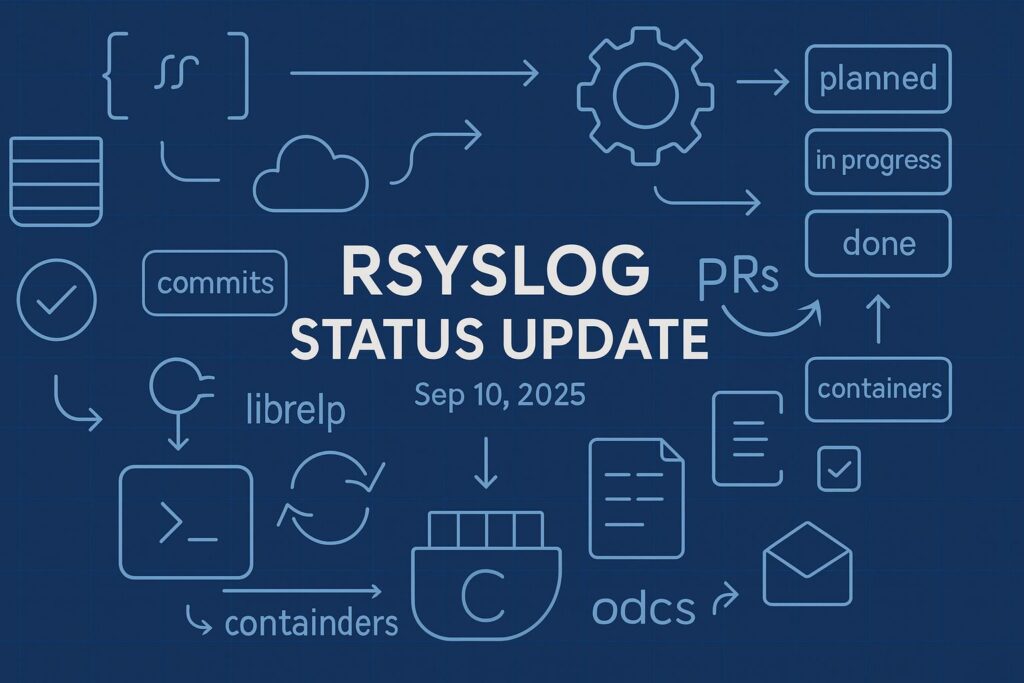rsyslog status update – what is going on?
There is lots of work going on with rsyslog currently. The last scheduled stable release, v8.2508.0 happened on August , 26th 2025. Be reminded that we offer daily stable releases which enable you to bnefit early from new features and bug fixes.

Highlights since the release scheduled stable release:
- ~100 commits landed in the daily-stable stream.
- ~150 older issues were revisited and closed, several as implemented feature requests.
- ~10 long-pending pull requests were merged with help from their original authors.
- librelp builds were fixed for GCC 15 where C23 is the default, and its CI was refreshed.
- CI across the project was modernized to improve coverage signal and reliability.
- Documentation restructuring continues with near-daily commits.
- Work is underway to optimize official project containers.
- New infrastructure was brought online with support from a continuing sponsorship.
omhttp refactor: status
The initial goal for the omhttp refactor was a one to two week sprint. Substantial progress was made, but new additions are paused so the implemented parts can be exercised within our containerization work. The objectives remain the same: predictable HTTP behavior in container environments, clear status semantics, and sensible batching by default. No breaking changes are introduced at this time; improvements will be accompanied by migration notes.
CI and toolchain updates
We invested in CI to increase signal quality and reduce friction for contributors. This includes newer runners and compilers, improved coverage capture and reporting, and reliability fixes that make pass/fail results more trustworthy. These changes benefit both community contributions and internal iteration speed.
librelp and GCC 15 (C23 default)
librelp did not compile cleanly with GCC 15 where C23 is the default. The code and CI were adjusted to restore clean builds and reduce downstream issues. Special thanks to Michael Biebl for his great help on this topic.
Backlog triage and community pull requests
Systematic triage of older issues and pull requests continued. Many tickets were closed with fixes or clarifications, and several turned into implemented feature requests. We appreciate the authors who returned to finish older pull requests; their patience helped close long-standing items cleanly.
Containers
Focus is shifting toward optimizing the project-provided containers. Goals include predictable defaults aligned with production, smaller differences between local development and deployment, and clearer guidance and examples. This work connects directly to the omhttp effort and the broader CI improvements.
Documentation
Documentation restructuring continues with near-daily updates. The emphasis is on smaller, clearer pages, consistent parameter documentation, and a structure that serves both human readers and AI-assisted navigation.
Infrastructure
New infrastructure is being brought online to support builds, testing, and staging. Ongoing sponsorship from Digital Ocean (Thx!) helps make this possible and is appreciated.
What’s next
- Complete the remaining omhttp refactor items and publish migration notes and recommended defaults.
- Land the next CI cleanups and keep coverage useful without adding noise.
- Maintain the steady cadence on closing older issues and pull requests.
- Advance container hardening and usage guidance.
- Continue the documentation split-ups and metadata cleanups.
- Introduce additional AI helpers that are already aiding internal workflows.
How to help
- Share which additional feature you would like to see.
- Share concrete edge cases for containerized HTTP outputs, especially partial-accept and retry semantics.
- Try out our new features, best via the daily-stable versions.
- For pull requests, keep changes focused, include tests when possible, and expect clearer CI signals.
